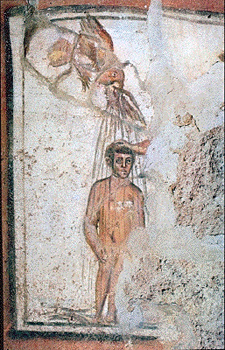You Belong to God
For Sunday July 27, 2014
Lectionary Readings (Revised Common Lectionary, Year A)
Genesis 29:15–28, or 1 Kings 3:5–12
Psalm 105:1–11, 45b, or Psalm 119:129–136
Romans 8:26–39
Matthew 13:31–33, 44–52
This past Easter, we had a baptism in our church. After the little boy rose from his third plunge beneath the waters, our priest made the sign of the cross on his forehead. As he did so, he recited those beautiful and powerful words: "William, you have been sealed with the Holy Spirit and marked with the cross of Christ. You belong to God."
The next day, he told his mother, "I can still feel the cross. I hope it never comes off."
The oily cross wore off his forehead, but not God's unconditional promise. William belongs to God, forever, full stop. Nothing can ever change that.
This baptismal promise echoes the baptism of Jesus by John the Baptist: "You are my beloved son." Writing in the Huffington Post about the baptism of Jesus, Vicki Flippin of The Church of the Village in New York City says, "I tell folks that baptism is the church declaring what has always been true, that each of us belongs to God and only to God. The child is claimed by God above all other claims."
Many malignant forces try to name and claim us. Baptism reminds us that first and foremost, above and beyond all other claims — however legitimate or oppressive — we belong to God.
 |
Catacomb of Callisto. |
We don't belong to our boss or the bank. We don't belong to an abusive spouse or our addictive impulses. We're not defined by sickness, success or failure. We don't belong to the political propagandists or the advertising industry. We're not the sum total of our poor choices, painful memories, or bad dreams.
"Even though it might feel like, look like, smell like, hurt like you belong to all these other things," says Flippin, "as sure as water is wet and God is good, I heard a voice out of the heavens say it: You belong to God. Our baptism can remind us that no one determines our worth in this world or in the next other than God."
Every person belongs to God. He created us. He cares for us. He calls us by name: "you are my beloved."
In the epistle this week, Paul describes our many weaknesses. In our ignorance we don't even know how to pray. We're oppressed by tribulations, distress, famine, nakedness, peril, and the sword.
Paul contrasts two ways of relating to God. We don't relate to God as a slave who fears a master, but as a child who feels safe with a father: "Abba, Father" (Romans 8:15, Galatians 4:6).
"Abba" is the Aramaic word used by Jesus that means something like "Papa." The word is used only three times in the New Testament, and conveys a shocking sense of human intimacy with the divine Infinite. It's a word that little children first learning to speak used for their father, and that Jesus himself used to speak to God in Mark 14:36.
We belong to God. We're his children. And so "we cry out, 'Abba! Father!'"
 |
Catacomb of Marcellinus and Peter. |
Because we belong to God as his children, we trust ourselves to his providential care: "We know that God causes all things to work together for good to those who love God, to those who are called according to his purpose" (8:28).
In his book God's Universe (2006), the Harvard astronomer Owen Gingerich writes about "questions without answers." When Gingerich was seventeen, his only brother was killed by a car while delivering newspapers on his bike. Decades later, in one of the last entries in his diary, Gingerich's devout Mennonite father still agonized over why God would allow such a tragedy to befall his teenage son.
Similarly, in his book The Language of God (2006), Francis Collins, former head of the Human Genome Project and now Director of the National Institute of Health, writes about his daughter's rape and how it challenges his faith even today. Why did God not intervene to protect his daughter? Why was the perpetrator never caught and brought to justice?
We all have "questions without answers." Paul would certainly agree, based upon his own apostolic experiences. But he was nonetheless adamant — we belong to God, and therefore nothing in all creation can separate us from the providential love of God (Romans 8:39).
Our task, says the poet Christian Wiman, is "not to ask for release or rescue, but that one's will be conformed to the will of God." And notice how Paul contrasts our two options — "conformed to the image of his son" or "conformed to the image of the world" (Romans 8:29 v. 12:2).
Trusting that we belong to God, that nothing can separate us from his providential care, and conforming ourselves to his will rather than to the ways of the world, "the greatest honor we can give almighty God," says Juliana of Norwich, "is to live gladly because of the knowledge of love."
Notes:
On Vicki Flippin's HuffPo sermon, see http://www.huffingtonpost.com/rev-vicki-flippin/you-belong-to-god_b_4560633.html.
On Christian Wiman, see the interview with him in Commonweal (April 16, 2014): https://www.commonwealmagazine.org/being-prepared-joy.
Image credits: (1) Wikipedia.org and (2) Wikipedia.org.





